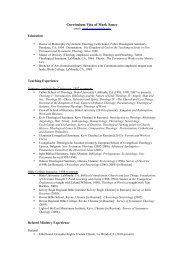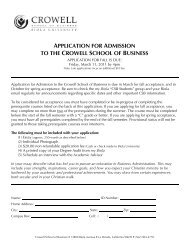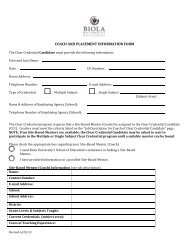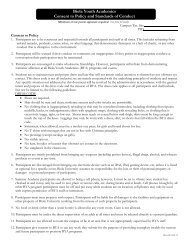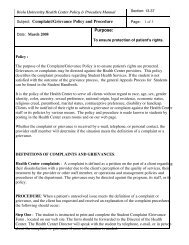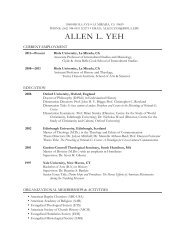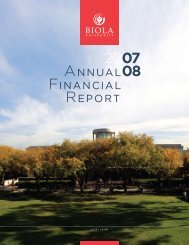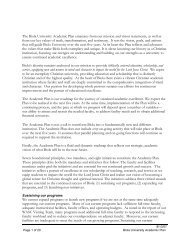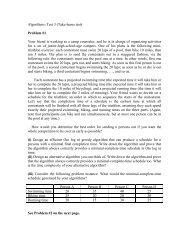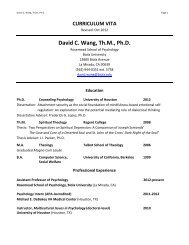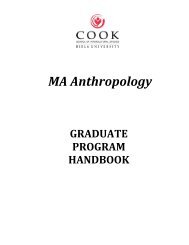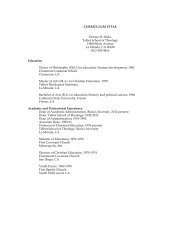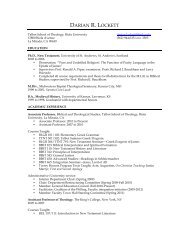Create successful ePaper yourself
Turn your PDF publications into a flip-book with our unique Google optimized e-Paper software.
director, cinematographer, gaffer, editor, sound designer, recording<br />
engineer, and/or production designer. Whether pursuing careers in<br />
the entertainment industry or media ministry, students will discover<br />
a spirit of cooperation and collaboration is essential. Students who<br />
choose this emphasis must include: 101, 102, 103, 104, 202, 204, 251<br />
or 262 or 315, 320, 358, 359, 440, 452 or 456, 470 and 6 units of upper<br />
division mass comm electives.<br />
Screen Writing Emphasis<br />
A screenwriting emphasis covers the fundamental elements of storytelling-from<br />
conception (the pitch and the outline), to execution (the<br />
script), to the all-important rewriting and polishing process. Through<br />
classes in the English department, students are encouraged to become<br />
vigorous readers. Students will also get a thorough grounding<br />
in the production process. Students who choose this emphasis must<br />
include: 101, 102, 103, 104, 202, 204, 320, 356, 366, 440, 447, 456, 470,<br />
ENGL 344 and either ENGL 220, 230, 240, 251 or 252 (in addition to<br />
the general education requirement).<br />
Admission Requirements:<br />
Film-Television-Radio program<br />
The Entertainment Industry is a highly competitive, creative, and<br />
demanding business. Admission to FTR is separate from and contingent<br />
upon your admission to <strong>Biola</strong> <strong>University</strong>. Admission to <strong>Biola</strong><br />
<strong>University</strong> does not guarantee admission into the FTR major of the<br />
Mass Communication Department. Applications to the FTR major<br />
will not be considered until after the applicant has been admitted<br />
to <strong>Biola</strong> <strong>University</strong>. Notifications concerning your acceptance to the<br />
FTR major will be processed by groups as listed on the application<br />
schedule page available from the Admissions Department.<br />
After you have completed your application to <strong>Biola</strong> <strong>University</strong>, submit<br />
your application to the FTR major by the appropriate deadline.<br />
See the application schedule page.<br />
Your application to the FTR major should include the following items.<br />
1. Completed FTR Application Form.<br />
2. Typed short answers to the questions on the second page of<br />
the Application Form.<br />
3. Three references with e-mail addresses.<br />
4. Any examples of your work or accomplishments you would<br />
want us to review. Quantity is not necessarily correlated with<br />
quality. We prefer one good example.<br />
Please be assured that media production experience is not a prerequisite<br />
for admission into the FTR major. Our program will show<br />
you how to use the tools. We are more interested in leadership<br />
ability, creative thinking, problem solving, and dreamers of credible<br />
character.<br />
The full department faculty will prayerfully review your application.<br />
Notification letters will be sent out by the deadlines listed in the<br />
schedule. You will be notified of your acceptance, placement on a<br />
waiting list or rejection.<br />
If you have any questions about the status of your application, please<br />
call the department secretary at 562-777-4<strong>05</strong>2 or write to:<br />
Acceptance Committee<br />
Mass Communication Department<br />
<strong>Biola</strong> <strong>University</strong><br />
13800 <strong>Biola</strong> Avenue<br />
La Mirada, CA 90639<br />
FTR Students are encouraged to purchase a computer with video<br />
editing software. While we understand the financial strains of such<br />
equipment expenditures, we also recognize that this technologically<br />
driven major involves costs well beyond the textbooks that serve<br />
as the essential tools for many other undergraduate departments.<br />
Contact the department for specific equipment recommendations.<br />
note: All Mass Communication majors must achieve a minimum<br />
grade of “C” in all major courses taken at <strong>Biola</strong>. Anyone receiving<br />
a lower grade must repeat the course and receive<br />
a “C” or better. The total number of units for major area<br />
credit from practicum, internship and directed research<br />
courses may not exceed nine units. Also, all Mass Communication<br />
Department majors are required to take the<br />
Biblical Studies 465 integration seminar for Bible credit.<br />
On-campus Study Opportunities<br />
b I o l a r a d I o<br />
<strong>Biola</strong> Radio gives you a great opportunity for hands-on practical<br />
experience. Check it out at www.biolaradio.com.<br />
b I o l a t e l e v I s I o n<br />
<strong>Biola</strong>’s television news service, keeps students, staff and alumni upto-date<br />
with campus events. Journalism students get practical experience<br />
in writing, reporting, announcing and producing electronic<br />
news for he Internet broadcast.<br />
t h e C h I m e s<br />
Journalism students get practical news reporting, photography,<br />
writing and editing experience by working for “The Chimes,” <strong>Biola</strong>’s<br />
weekly newspaper.<br />
t h e b I o l a n<br />
Our college yearbook provides not only years of memories, but practical<br />
experience in photography, layout and writing.<br />
20<strong>05</strong> – 20<strong>07</strong> C ATA LO G Undergraduate Programs 113



